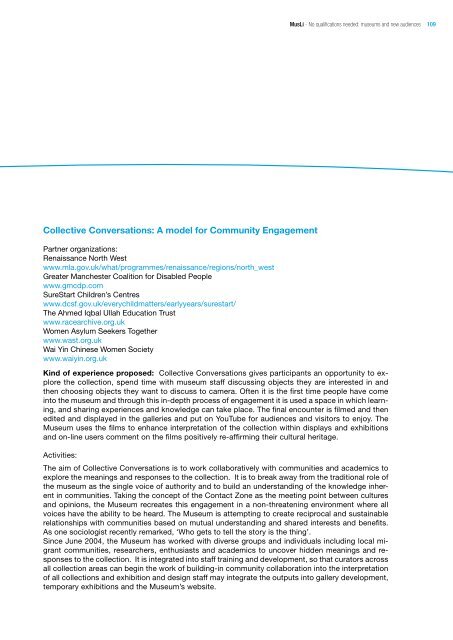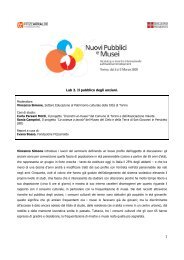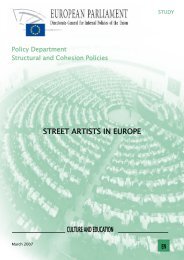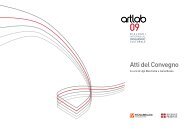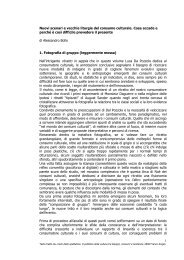MusLi (Museums Literacy) - Fondazione Fitzcarraldo
MusLi (Museums Literacy) - Fondazione Fitzcarraldo
MusLi (Museums Literacy) - Fondazione Fitzcarraldo
You also want an ePaper? Increase the reach of your titles
YUMPU automatically turns print PDFs into web optimized ePapers that Google loves.
Collective Conversations: A model for Community Engagement<br />
Partner organizations:<br />
Renaissance North West<br />
www.mla.gov.uk/what/programmes/renaissance/regions/north_west<br />
Greater Manchester Coalition for Disabled People<br />
www.gmcdp.com<br />
SureStart Children’s Centres<br />
www.dcsf.gov.uk/everychildmatters/earlyyears/surestart/<br />
The Ahmed Iqbal Ullah Education Trust<br />
www.racearchive.org.uk<br />
Women Asylum Seekers Together<br />
www.wast.org.uk<br />
Wai Yin Chinese Women Society<br />
www.waiyin.org.uk<br />
<strong>MusLi</strong> - No qualifications needed: museums and new audiences<br />
Kind of experience proposed: Collective Conversations gives participants an opportunity to explore<br />
the collection, spend time with museum staff discussing objects they are interested in and<br />
then choosing objects they want to discuss to camera. Often it is the first time people have come<br />
into the museum and through this in-depth process of engagement it is used a space in which learning,<br />
and sharing experiences and knowledge can take place. The final encounter is filmed and then<br />
edited and displayed in the galleries and put on YouTube for audiences and visitors to enjoy. The<br />
Museum uses the films to enhance interpretation of the collection within displays and exhibitions<br />
and on-line users comment on the films positively re-affirming their cultural heritage.<br />
Activities:<br />
The aim of Collective Conversations is to work collaboratively with communities and academics to<br />
explore the meanings and responses to the collection. It is to break away from the traditional role of<br />
the museum as the single voice of authority and to build an understanding of the knowledge inherent<br />
in communities. Taking the concept of the Contact Zone as the meeting point between cultures<br />
and opinions, the Museum recreates this engagement in a non-threatening environment where all<br />
voices have the ability to be heard. The Museum is attempting to create reciprocal and sustainable<br />
relationships with communities based on mutual understanding and shared interests and benefits.<br />
As one sociologist recently remarked, ‘Who gets to tell the story is the thing’.<br />
Since June 2004, the Museum has worked with diverse groups and individuals including local migrant<br />
communities, researchers, enthusiasts and academics to uncover hidden meanings and responses<br />
to the collection. It is integrated into staff training and development, so that curators across<br />
all collection areas can begin the work of building-in community collaboration into the interpretation<br />
of all collections and exhibition and design staff may integrate the outputs into gallery development,<br />
temporary exhibitions and the Museum’s website.<br />
109


